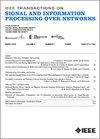Distributed Proportional-Integral Algorithms for Multiple Coalition Games Under Limited Communication Resources
IF 3
3区 计算机科学
Q2 ENGINEERING, ELECTRICAL & ELECTRONIC
IEEE Transactions on Signal and Information Processing over Networks
Pub Date : 2025-04-10
DOI:10.1109/TSIPN.2025.3559442
引用次数: 0
Abstract
This paper studies the algorithm design for multiple coalition games under limited communication resources, in which the players in the same coalition cooperatively optimize the summation of cost functions in this coalition and do not care about the costs of other coalitions. To address this game, we develop a distributed proportional-integral algorithm based on the coalition estimate strategy and the proportional-integral principle. Furthermore, when the communication resource is concretely quantified by bit rates in communication channels, we propose a coding-decoding-based distributed proportional-integral algorithm based on the distributed proportional-integral algorithm and coding-decoding rules for seeking the Nash equilibrium of multiple coalition games. It proves that both algorithms linearly and precisely converge to the Nash equilibrium in spite of limited communication resources. Then, the necessary and sufficient condition for the linear convergence of the proposed algorithm about the requirement of bit rates is presented. Moreover, the relationship between the bit rate and the convergence speed of the proposed algorithm is also theoretically explained. Lastly, the simulation in formation problems of unmanned vehicle swarms is presented to demonstrate the effectiveness of proposed algorithms.有限通信资源下多联盟博弈的分布式比例积分算法
本文研究了有限通信资源下的多联盟博弈算法设计,其中同一联盟中的参与者在不关心其他联盟成本的情况下,共同优化本联盟的成本函数之和。为了解决这一博弈,我们基于联盟估计策略和比例积分原理开发了一种分布式比例积分算法。此外,当通信资源以通信信道中的比特率具体量化时,我们提出了一种基于分布式比例积分算法和编解码规则的基于编解码的分布式比例积分算法,用于寻求多联盟博弈的纳什均衡。证明了在通信资源有限的情况下,两种算法都能线性和精确地收敛于纳什均衡。然后给出了该算法在码率要求下线性收敛的充分必要条件。此外,还从理论上解释了比特率与算法收敛速度之间的关系。最后,通过对无人驾驶车辆群体的编队问题进行仿真,验证了算法的有效性。
本文章由计算机程序翻译,如有差异,请以英文原文为准。
求助全文
约1分钟内获得全文
求助全文
来源期刊

IEEE Transactions on Signal and Information Processing over Networks
Computer Science-Computer Networks and Communications
CiteScore
5.80
自引率
12.50%
发文量
56
期刊介绍:
The IEEE Transactions on Signal and Information Processing over Networks publishes high-quality papers that extend the classical notions of processing of signals defined over vector spaces (e.g. time and space) to processing of signals and information (data) defined over networks, potentially dynamically varying. In signal processing over networks, the topology of the network may define structural relationships in the data, or may constrain processing of the data. Topics include distributed algorithms for filtering, detection, estimation, adaptation and learning, model selection, data fusion, and diffusion or evolution of information over such networks, and applications of distributed signal processing.
 求助内容:
求助内容: 应助结果提醒方式:
应助结果提醒方式:


